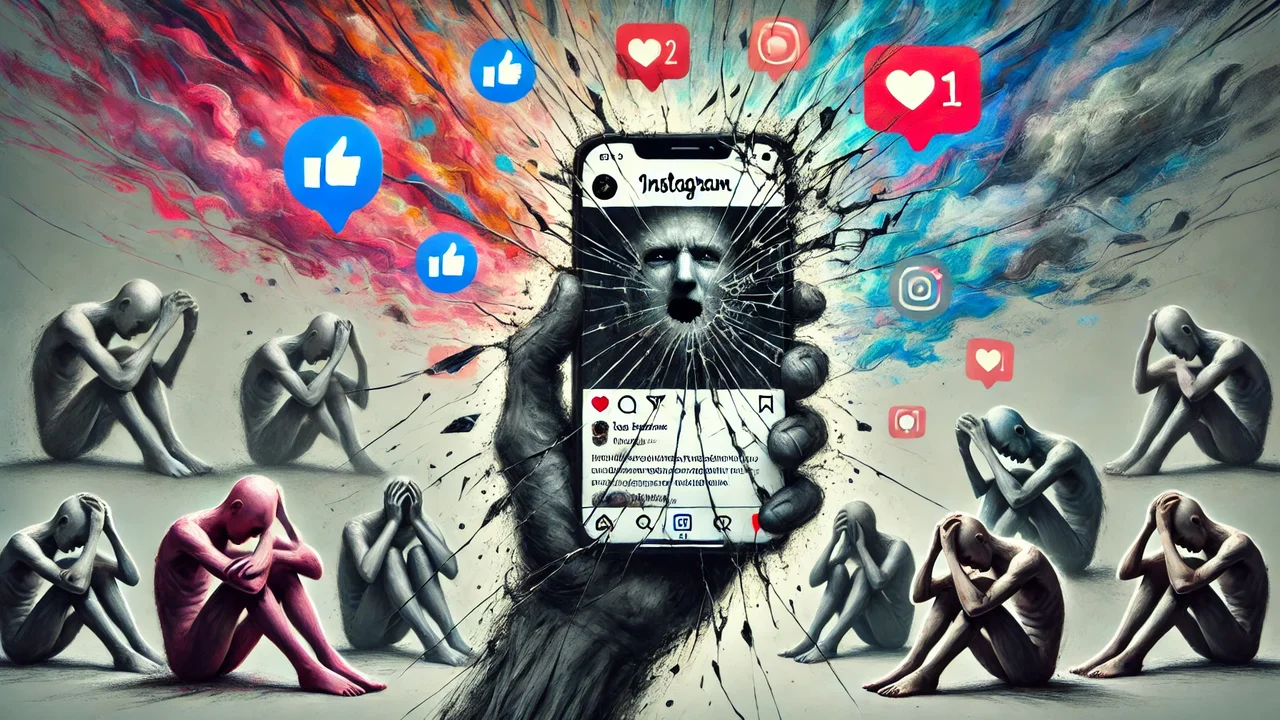Introduction
Instagram and other social media have changed the way people communicate, share ideas, and look for approval in today’s digital world. Although these platforms provide chances for creativity and connection, they also pose certain distinct risks to mental health. One of these difficulties is “igagony,” a word that describes the terrible feeling people have when their Instagram posts don’t get the likes or comments they were hoping for. This trend is on the rise, and it’s making many worried about the mental health consequences of social media.
What is Igagony and Why Does it Matter?
“Igagony” is a portmanteau of “Instagram” and “agony,” representing the mental anguish that comes from Instagram postings that don’t get many likes or comments. Users put in a lot of work to curate visually appealing information, and they want other users to validate their efforts by liking, commenting, and sharing it. Feelings of inadequacy, rejection, and anxiety might set up when these expectations aren’t satisfied.
Digital disillusionment is only the tip of the iceberg when it comes to issues of social status, self-esteem, and the constraints imposed by comparison culture. Keeping one’s mental health in check in this social media age requires awareness of and action against igagony.
The Roots of Igagony: Why Instagram Affects Self-Esteem
The Role of Social Validation
Likes, shares, and comments are the lifeblood of social media networks. Metrics like this act as digital validation, which boosts confidence and self-esteem. Users’ sense of self-worth could take a hit when interaction falls short of expectations.
Comparison Culture on Instagram
Instagram users frequently display idealised versions of their life, creating the impression of a well crafted reality. Because people are constantly comparing themselves to others and their supposedly flawless lives, they develop emotions of inadequacy and igagony, which are worsened by this culture of comparison.
The Pressure to Curate Perfect Content
Consumers prepare and modify their content with great care because they want it to be flawless. It can be emotionally taxing if the content doesn’t get traction, no matter how much effort they put in. A continual requirement for external validation is generated by this cycle.
Negative Feedback and Online Rejection
Igogony is worsened by the effects of nasty comments or trolling. Anxieties and reluctance to engage in future social media conversations may result from the long-lasting effects of criticism.
The Role of Algorithms
Posts with little initial interaction have a harder time reaching bigger audiences on Instagram since the algorithm prioritises material based on engagement. When people aren’t involved, they become even more invisible, which just adds to their feelings of failure.
How Igagony Affects Mental Health

Increased Anxiety and Stress
Feelings of anxiety and stress might intensify when we wait for feedback and then are let down. On a daily basis, emotional stability and functional capacity are both affected by this mental load.
Self-Worth and Identity Crisis
A lack of interaction on social media might make one feel like they’ve failed because it becomes associated with their sense of self. Low self-esteem may set in after a while.
FOMO (Fear of Missing Out)
When users aren’t actively participating, they may start to feel lonely and unconnected, which can lead to feelings of FOMO. Isolation and feelings of inadequacy are worsened by this worry.
Depression and Loneliness
Igagony can cause depression and feelings of isolation if it lasts too long. A user’s dependence on the platform for approval can lead them to isolate themselves from real-life encounters.
The Vicious Cycle of Addiction
Spending more time on Instagram in an effort to “fix” poor engagement is a common consequence, adding to the emotional toll and reinforcing the igagony cycle.
Strategies to Overcome Igagony
Recognizing the Curated Nature of Content
Keep in mind that the majority of Instagram posts are handpicked. No one benefits from or deserves to have their life compared to an idealised version of someone else’s.
Setting Realistic Expectations
Most importantly, you must realise that engagement numbers are not a measure of your value. To keep expectations reasonable, be aware that Instagram’s algorithm is notoriously unpredictable.
Practicing Digital Detox
Instagram users can improve their mental health and lessen their reliance on digital validation by taking vacations from the app and re-establishing connections with real-life experiences and relationships.
Building Self-Worth Outside Social Media
Building a sense of self-worth outside from online interactions is possible through engaging in hobbies, cultivating human relationships, and concentrating on personal progress.
Seeking Professional Help
Individuals who are profoundly impacted by igagony may find that therapy or counselling helps them cope with the stress that comes from social media and helps them develop a more positive attitude.
The Science Behind Social Media Anxiety
Dopamine and Reward Mechanisms
Dopamine is the “feel-good” neurotransmitter in the brain, and social networking sites are built to take advantage of it. Rewarding behaviour is reinforced with each like or comment. A lack of these rewards might cause people to retreat emotionally and experience unhappiness.
The Role of Cognitive Dissonance
A user’s self-esteem is frequently inflated by the value they assign to their online persona. Emotional distress, or cognitive dissonance, happens when low participation runs counter to this assumption.
Impact on Adolescent Brains
Igagony is especially harmful to adolescents because they are still coming into their own as individuals. They are more likely to experience anxiety and sadness due to their dependence on social approval.
Neuroplasticity and Social Media Habits
The brain can become more vulnerable to emotional setbacks and online rejection after repeated exposure to igagony.
Hormonal Responses to Stress
When engagement levels are low, the body reacts by releasing cortisol and other stress hormones. Both mental and physical well-being can be affected by prolonged exposure to these hormone variations.
The Road Ahead: Redefining Social Media Relationships
Despite their pervasiveness in today’s society, people should not let their self-esteem be determined by their social media accounts. One way to improve one’s interaction with Instagram and other social media is to learn about igagony and how it works. People may confidently and resiliently manage the digital environment if they focus less on external validation and more on personal progress and genuine connections.
Get ready to dive into practical solutions, real-life examples, and expert insights that will help you conquer igagony and take charge of your mental health in the part that follows. Get ready for more!
The Psychological Drivers Behind Igagony
The Influence of Instant Gratification
Instagram and similar social media sites aim to provide users a quick fix. Users anticipate instantaneous interaction, such as likes and comments, after they publish an item. Disappointment and annoyance can set in when the brain’s reward system is interrupted by the lack of this immediate reaction. The longer it takes for a user to receive their reward, the more anxious they may become and less likely they are to use the platform.
Social Comparison and Self-Evaluation
People who use Instagram tend to live in a perpetual state of self-comparison. Follower numbers, likes, and comments start to feel like yardsticks for achievement and value. When people measure their success against the flawless lives of others, it’s easy to see how this habitual comparison contributes to feelings of inadequate. As a result, igagony is fuelled by a warped perception of reality.
Fear of Negative Judgments
Users may be hesitant to share genuine content due to concerns about receiving negative feedback on their articles. Worry levels rise due to the increased pressure to generate “likeable” content or follow current trends. A user’s poor self-perception might be reinforced if they internalise a post’s underperformance as a reflection of their own worth.
Cultural Impacts of Igagony
Societal Emphasis on Digital Success
People, especially younger ones, tend to think that being popular on social media means you’re successful in life. When people’s expectations aren’t satisfied, they experience increased stress and emotional vulnerability because of the societal narrative that pushes them to conform online.
The Role of Influencers in Setting Unrealistic Standards
When it comes to Instagram, influencers are kingmakers. Their flawless lives serve as an impossible standard for the rest of us to reach. When people fall short of these expectations, it can lead to feelings of inadequacy and uncertainty about themselves.
The Shift Toward Authentic Content
I find it interesting that typical Instagram aesthetics are starting to face competition from more genuine and unvarnished content. In an effort to lessen the cultural drive for perfection, there have been movements advocating for authentic, unfiltered images with truthful captions. This change gives us reason to think that we can eventually see igagony rates drop.
Conclusion
Reflecting the complicated emotional toll of Instagram involvement, ignogony is an increasing digital age worry. Individuals might start to liberate themselves from the validation and comparison cycle by comprehending its cultural and psychological foundations. The key to regaining mental health in this digital age is to be real, to practise self-compassion, and to establish limits with social media.
Must Visit: Flixier: Redefining Video Editing in the Cloud
Frequently Asked Questions
What is the psychological impact of low Instagram engagement?
Low engagement can lead to anxiety, stress, and reduced self-esteem. It often creates a cycle of dependency, where users seek validation but feel disappointed when it’s not received.
How can I stop comparing myself to others on Instagram?
Recognize that Instagram content is curated and not reflective of reality. Focus on personal growth and achievements rather than online metrics.
Why do Instagram likes matter so much?
Likes serve as a form of digital validation, providing a sense of accomplishment and acceptance. This psychological reinforcement makes them feel significant.
Can therapy help with Instagram anxiety?
Yes, therapy can help individuals develop coping mechanisms, challenge negative thought patterns, and build resilience against social media-induced stress.
How can I build confidence without social media validation?
Engage in activities that bring personal fulfillment, such as hobbies or community involvement. Build relationships and skills that provide intrinsic satisfaction.

My name is Nancy Rose, and I’m a passionate blogger at Techiwell.com, a platform dedicated to exploring technology, business, entertainment, and general topics. I strive to create engaging, insightful, and informative content to keep readers updated and inspired in our fast-changing world.

1 thought on “Igagony: Exploring Instagram’s Emotional Impact”